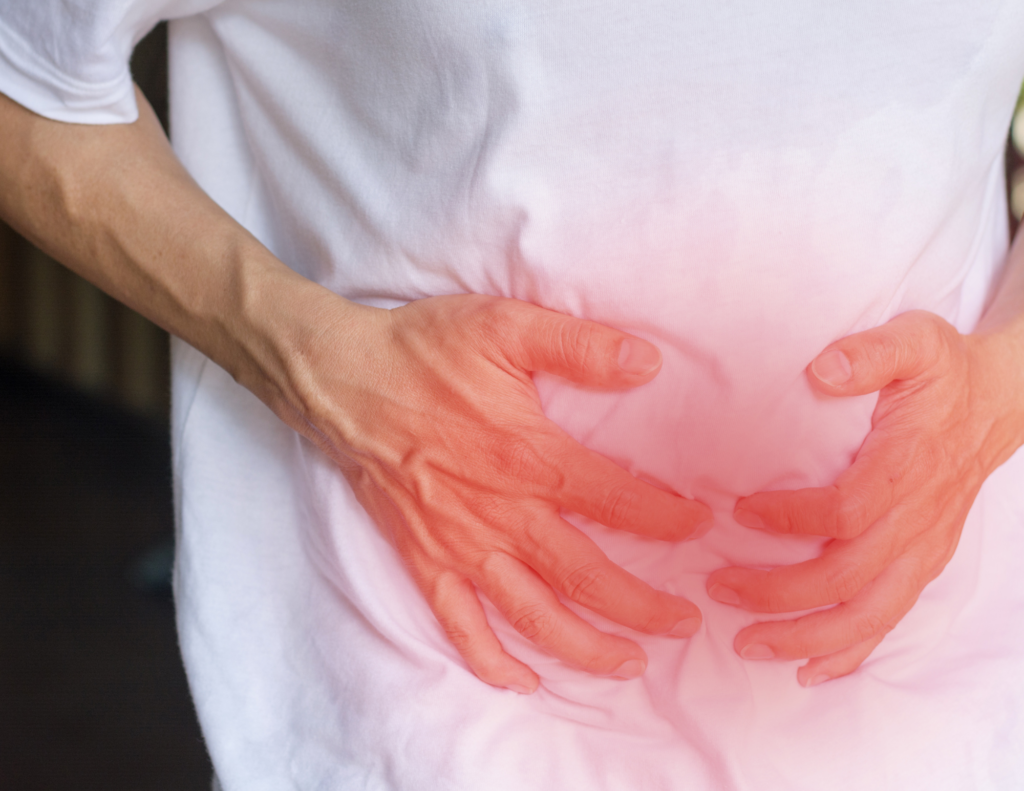Crohn’s Disease

Crohn’s disease is a chronic Autoimmune Condition that causes inflammation of the digestive tract, leading to symptoms such as abdominal pain, diarrhea, fatigue, weight loss, and malnutrition. It is one of the two main types of inflammatory bowel disease (IBD), the other being ulcerative colitis. While the exact cause remains unclear, Crohn’s is believed to result from a combination of genetic predisposition, immune system dysfunction, environmental factors, and gut microbiota imbalances.¹
Although there is no known cure for Crohn’s disease, adopting a holistic and lifestyle-focused approach through Functional Medicine can help manage symptoms, reduce inflammation, and promote long-term remission. Below, we’ll explore key elements of managing Crohn’s disease holistically, including dietary changes, lifestyle adjustments, and the role of advanced testing.
Learn the difference between Functional Medicine and Conventional Medicine →
The Lifestyle Approach to Managing Crohn’s Disease
A lifestyle approach focuses on addressing the root causes of inflammation, supporting the immune system, and optimizing overall health. Here are some strategies:
Stress Management
Chronic stress can exacerbate inflammation and worsen Crohn’s symptoms.² Incorporate stress-reducing practices such as:
- Mindfulness meditation and breathing exercises.
- Yoga or gentle movement to reduce tension.
- Engaging in hobbies or activities that bring joy and relaxation.
Healthy Relationships and Social Connections
Building and maintaining healthy relationships is crucial for emotional well-being and can positively influence physical health, including Crohn’s disease management. Feeling supported by family, friends, or a community can reduce stress and promote resilience. Make time for meaningful interactions, whether through shared meals, conversations, or participating in group activities.³
Making Time for Things You Enjoy
Doing activities you love can significantly improve your mental health, reduce stress, and provide a sense of fulfillment. Whether it’s painting, gardening, reading, or exploring nature, dedicating time to enjoyable pursuits helps shift focus away from illness and toward positivity.
Sleep Hygiene
Quality sleep is essential for immune regulation and healing.4 Aim for 7–9 hours of restorative sleep by:
- Maintaining a consistent sleep schedule.
- Creating a calming bedtime routine.
- Reducing screen time an hour before bed.
Movement and Exercise
Gentle, low-impact exercises can help manage inflammation and improve mood. Options include walking, swimming, tai chi, or Pilates. Avoid overexertion, which can trigger symptoms.
Gut Health Optimization
Supporting gut health is central to managing Crohn’s. This involves maintaining a balanced microbiome through diet, supplementation, and avoiding known irritants.
ARTICLE CONTINUES BELOW
Schedule Your Telehealth Consultation
We would love to sit down with you and chat about your experiences and current health complaints.
Top 3 Foods to Remove from Your Diet
Certain foods can aggravate inflammation and irritate the gut lining, worsening Crohn’s symptoms. Removing these from your diet can help calm the immune system:
- Gluten Gluten, a protein found in wheat, barley, and rye, can trigger inflammation in sensitive individuals. Even without celiac disease, many people with Crohn’s experience symptom relief by eliminating gluten.5
- Dairy Dairy products can be problematic for those with lactose intolerance or sensitivity. They may increase inflammation and contribute to bloating, cramping, and diarrhea.
- Processed Foods Foods high in refined sugars, unhealthy fats, and artificial additives can disrupt gut health and promote inflammation. These include sugary snacks, fried foods, and packaged meals.
Top 3 Foods to Add to Your Diet
Incorporating nutrient-dense, anti-inflammatory foods into your diet can support healing and help manage symptoms:
- Bone Broth Rich in collagen and amino acids like glycine and proline, bone broth supports gut lining repair and reduces inflammation. It’s also easy to digest, making it ideal for those with digestive issues.
- Fatty Fish Salmon, mackerel, and sardines are high in omega-3 fatty acids, which have potent anti-inflammatory properties. These healthy fats can help reduce intestinal inflammation and support overall immune health.
- Cooked Vegetables Steamed or roasted non-starchy vegetables like zucchini, carrots, and spinach are gentle on the digestive tract and packed with vitamins, minerals, and antioxidants. Cooking these vegetables makes them easier to digest, which is essential for Crohn’s management.
Foods and Teas to Lower Gut Inflammation
Certain foods and teas can help soothe inflammation in the gut and provide additional support for managing Crohn’s disease:
Soothing Foods
- Turmeric: Curcumin, the active compound in turmeric, is a powerful anti-inflammatory. Add turmeric to soups, stews, or smoothies, or take it as a supplement for targeted support.
- Ginger: Known for its anti-inflammatory and digestive properties, ginger can be used in teas, added to recipes, or taken as a supplement.
- Aloe Vera Juice: Pure aloe vera juice can help soothe the gut lining and reduce inflammation. Choose a high-quality, food-grade product.
Anti-Inflammatory Tea Recipes
- Chamomile Tea
Ingredients:
- 1 cup hot water
- 1–2 teaspoons dried chamomile flowers (or 1 chamomile tea bag)
- 1 teaspoon honey (optional)
Instructions:
- Add chamomile flowers or tea bag to a mug.
- Pour hot water over the tea and steep for 5–7 minutes.
- Strain, sweeten with honey if desired, and enjoy.
- Peppermint Tea
Ingredients:
- 1 cup hot water
- 1 teaspoon dried peppermint leaves (or 1 peppermint tea bag)
- Lemon slice (optional)
Instructions:
- Add peppermint leaves or tea bag to a mug.
- Pour hot water over the tea and steep for 5–7 minutes.
- Add a slice of lemon for extra flavor, if desired, and serve.
- Licorice Root Tea
Ingredients:
- 1 cup hot water
- 1 teaspoon licorice root (deglycyrrhizinated, if preferred)
- 1 teaspoon honey (optional)
Instructions:
- Add licorice root to a mug or tea strainer.
- Pour hot water over the tea and steep for 5–7 minutes.
- Sweeten with honey if desired, then enjoy.
The Role of Advanced Testing in Managing Crohn’s Disease
Identifying the root cause of what triggers your autoimmune condition is essential for creating a personalized wellness plan. Advanced testing can uncover underlying factors such as:
- Food sensitivities or intolerances.
- Nutritional deficiencies, including vitamins and minerals like B12, D, and iron.
- Gut microbiome imbalances or infections.
- Environmental toxins or mold exposure.
Learn more about our Functional Medicine testing compared to generic testing →
At Back On Track 2 Wellness, we help determine the most appropriate tests based on your unique history and symptoms. Once we receive the results, we use the data to craft a comprehensive plan tailored to your needs. This plan may include dietary adjustments, targeted supplementation, and lifestyle recommendations to address the specific triggers contributing to your condition.
Getting Help
Living with Crohn’s disease can feel overwhelming, but you don’t have to navigate it alone. Our holistic approach empowers you to take control of your health, manage symptoms, and improve your quality of life. Whether you’re exploring advanced testing or need guidance on diet, lifestyle, or building stronger relationships, we’re here to support you on your wellness journey.
Schedule Your Telehealth Consultation
We would love to sit down with you and chat about your experiences and current health complaints.
The information on this website has not been evaluated by the Food & Drug Administration or any other medical body. We do not aim to diagnose, treat, cure or prevent any illness or disease. Information is shared for educational purposes only. You must consult your doctor before acting on any content on this website, especially if you are pregnant, nursing, taking medication, or have a medical condition.

By Dr. Todd W. Bunning
Dr. Todd W. Bunning’s Chiropractic and Functional Medicine services reach far beyond the local Roseville area, with webcam consultations available for patients in any location. With over 21+ years of Private Practice experience, Dr. Todd continues to focus on the individual: science-based methods to address whole-body health factors.
Dr. Todd’s education didn’t stop when he graduated from Life West Chiropractic College in 2003. Today, he’s continuing to receive training and is chipping away on numerous post-graduate degree programs. This unique blend of clinical health investigation and Lifestyle Medicine application helps people of all ages find the underlying factors that result in chronic disease.